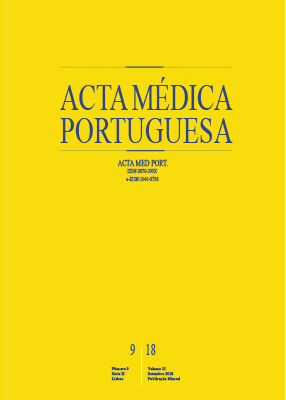Agentes Biossimilares no Tratamento da Psoríase: Perspetiva dos Doentes Portugueses
DOI:
https://doi.org/10.20344/amp.10127Palavras-chave:
Medicamentos Biossimilares, Psoríase/tratamento, Terapia BiológicaResumo
Introdução: Os agentes biossimilares são cópias muito semelhantes de agentes biológicos originais previamente aprovados. A sua introdução no mercado tem como objetivo reduzir custos. O objetivo deste estudo foi avaliar as perspetivas dos doentes com psoríase sobre os medicamentos biossimilares.
Material e Métodos: Foi realizado um inquérito com 14 questões em doentes com psoríase medicados com agentes biológicos e seguidos num Serviço de Dermatologia de um hospital terciário português.
Resultados: Dos 108 doentes incluídos, 70,4% desconheciam a definição de agente biossimilar e 76,6% mostraram interesse parcial ou total no uso de medicamentos biossimilares. Perto de 80% concordaram com o uso de agentes biossimilares de modo a reduzir os custos associados às terapêuticas biológicas. Contudo, a ausência de estudos na população europeia e em doentes com psoríase levaram a maioria dos doentes (72,2% e 75,0%, respetivamente) a oporem-se, parcial ou totalmente, ao uso dos medicamentos biossimilares. Dados demográficos, rendimento mensal e tipo de terapêutica biológica não influenciaram as preferências dos doentes.
Discussão: Apesar do desconhecimento dos participantes sobre os medicamentos biossimilares, a maioria dos doentes parece recetiva à sua utilização. Todavia, existem dois motivos de preocupação: i) o uso de medicamentos biossimilares que não foram testados na população europeia, e ii) a sua aprovação para a psoríase sem estudos nesta doença. Assim, é necessário fornecer mais informação aos doentes sobre os medicamentos biossimilares.
Conclusão: Os biossimilares podem aumentar o acesso dos doentes a terapêuticas biológicas. Melhor comunicação e o envolvimento dos doentes na tomada de decisões relativamente aos medicamentos biossimilares pode aumentar a adesão no futuro.
Downloads
Downloads
Publicado
Como Citar
Edição
Secção
Licença
Todos os artigos publicados na AMP são de acesso aberto e cumprem os requisitos das agências de financiamento ou instituições académicas. Relativamente à utilização por terceiros a AMP rege-se pelos termos da licença Creative Commons ‘Atribuição – Uso Não-Comercial – (CC-BY-NC)’.
É da responsabilidade do autor obter permissão para reproduzir figuras, tabelas, etc., de outras publicações. Após a aceitação de um artigo, os autores serão convidados a preencher uma “Declaração de Responsabilidade Autoral e Partilha de Direitos de Autor “(http://www.actamedicaportuguesa.com/info/AMP-NormasPublicacao.pdf) e a “Declaração de Potenciais Conflitos de Interesse” (http://www.icmje.org/conflicts-of-interest) do ICMJE. Será enviado um e-mail ao autor correspondente, confirmando a receção do manuscrito.
Após a publicação, os autores ficam autorizados a disponibilizar os seus artigos em repositórios das suas instituições de origem, desde que mencionem sempre onde foram publicados e de acordo com a licença Creative Commons









